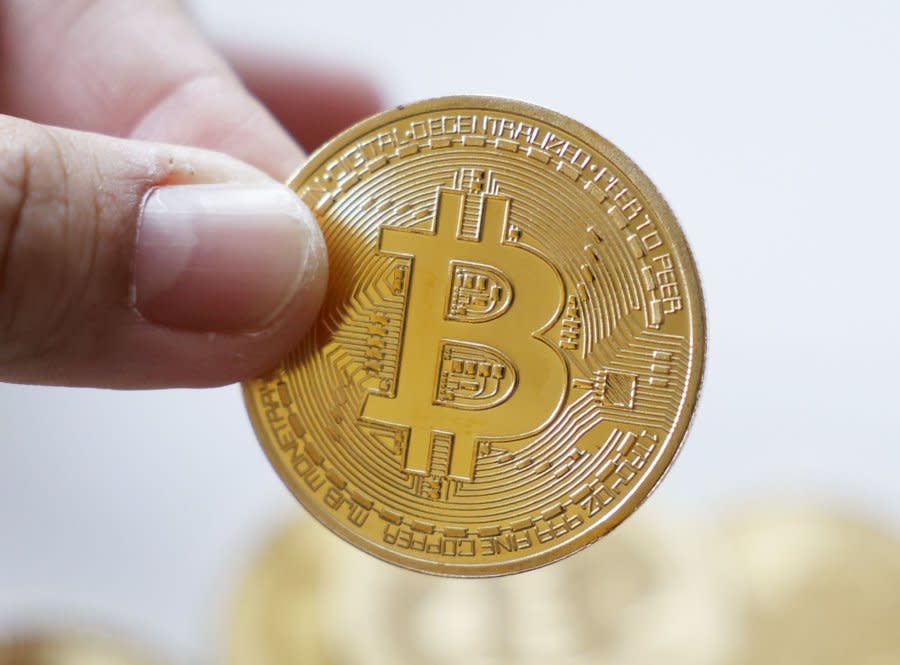Frenzied pace for bitcoin ETF trading tops $1B during first hour Thursday

Jan. 11 (UPI) -- The first day of bitcoin exchange-traded funds in New York Stock Exchange trading topped $1 billion in just an hour Thursday.
Investors showed their excitement by purchasing ETFs in 11 new investment vehicles listed for the first time on the NYSE Arca electronic trading platform.
Within an hour of the opening bell Thursday morning, Grayscale Bitcoin Trust sold $456 million in bitcoin ETFs, followed by iShares Bitcoin Trust, $388 million, and Fidelity Wise Origin Bitcoin Trust, $226 million, Yahoo Finance reported.
The top three bitcoin ETF traders sold a combined $1.07 billion in ETFs to investors in the first hour. Other bitcoin ETF traders sold about $135 million in bitcoin ETFs during that hour on the NYSE Arca trading platform.
Early trading reached a peak price of $43.35 for Grayscale's GBTC ETFs, which soon dropped to a low of $40.20 before recovering to $40.69 at the end of the day's trading. It rose to $40.88 in after-hours trading. More than 56 million GBTC ETFs changed hands.
The Security and Exchange Commission's approval Wednesday of 11 bitcoin-based ETF investment vehicles on the NYSE caused mixed reactions among cryptocurrency and financial experts.
Grayscale led charge
Grayscale Investments led the charge to get federal approval for trading bitcoin-based ETFs on the NYSE Arca platform. Now that the ETFs are being traded on the NYSE Arca, they no longer are traded on over-the-counter trading platforms.
"We believed that bitcoin could change the world, and we were and remain excited at the prospect of democratizing access to this asset through a U.S.-regulated investment vehicle," Grayscale CEO Michael Sonnenshein said in a release Wednesday.
"The approval of spot bitcoin ETFs in the United States is a monumental step forward."
While Grayscale's CEO is optimistic, others say crypto investing is fraught with significant risks.
Philadelphia-based Vanguard is one of the nation's largest ETF traders, but its officials say Vanguard is staying out of the bitcoin ETF business. Vanguard won't even allow others to trade bitcoin ETFs on its platform, a Vanguard spokesperson told CNBC.
Many others are skeptical of bitcoin ETFs and recommend anyone considering investing in them to be very cautious.
Reserve Bank of India governor Shaktikanta Das compared crypto trading to trading tulip bulbs, which in the 1630s spurred highly risky investing that eventually triggered a financial collapse in Holland.
"The RBI's position on cryptocurrency remains unchanged. Traveling down that path will create huge risks," Das told an audience during the Mint BFSI Summit on Thursday. "I don't think the world or emerging markets can take a crypto mania like the tulip mania."
Called a serious threat
Das said cryptocurrencies are a "serious threat to financial stability for all countries - especially for emerging markets" and cited a recent white paper on cryptocurrencies issued last year by the International Monetary Fund .
The IMF cautioned that "a widespread proliferation of crypto assets comes with substantial risks to the effectiveness of monetary policy, exchange rate management and capital flow management as well as to fiscal sustainability."
The IMF said crypto assets are either backed or unbacked with reserve assets providing tangible value for backed crypto assets, which are referred to as "stablecoins." Bitcoin, though, is an unbacked crypto asset that has no value because it isn't tied to any future profit streams or coupon payments, according to the IMF.
At least one SEC commissioner says bitcoin-based ETFs are a bad idea and pose a substantial risk for investors and others.
The SEC's approval of the bitcoin-based products listing "put us on a wayward path that could further sacrifice investor protection," SEC commissioner Caroline Crenshaw said in a dissenting statement. "I cannot agree that these actions serve either our statutory or foundational investor protection mandates."
Fraud, manipulation cited
Crenshaw said the bitcoin trading products are tied to global spot markets that "are marred by fraud and manipulation, concentrated and without adequate oversight." Such bitcoin-based spot markets are unsafe for investors and lack transparency, she added.
An example of market manipulation Crenshaw cited in her dissent is "wash trading," which she called pervasive in cryptocurrency trading and especially bitcoin markets.
She said wash trading occurs when the people selling their bitcoin products buy them for increasingly higher rates to drive up their prices and create the illusion of "high trading interest" until "selling to unwitting third-party market participants at inflated values."
Wash trading "distorts price and volume, causes volatility, reduces investor confidence and participation in financial markets, and of course, results in investor harm," Crenshaw said.
She cited a recent analysis of 29 major crypto exchanges in which wash trading accounted for up to 77.5% of trading volume in unregulated exchanges.
Officials with the SEC on Wednesday reversed their prior denial of Grayscale Investments' request to sell bitcoin-based trading products on the Arca trading platform.
SEC denial
Officials with Grayscale Investments sought SEC approval to convert the Grayscale Bitcoin Trust into an exchange-traded product. The SEC denied the request, which Grayscale opposed in a federal appellate court filing that was argued on March 7.
The federal appellate court ordered the SEC to vacate its denial of Grayscale's request in light of the SEC's approval of similar requests by other traders.
The reversal occurred nearly five months after the Washington D.C. federal appellate court ordered the SEC's prior denial be vacated.
The U.S. Court of Appeals in Washington, D.C., on Aug. 29 ruled that SEC officials improperly denied Grayscale Investments' request to list bitcoin on the NYSE Arca trading exchange for ETFs and other products.

